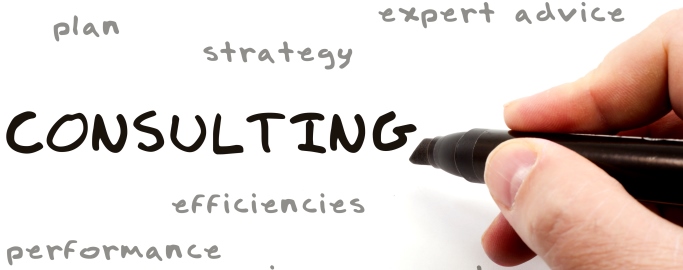
If you’re planning to pursue a career in consulting, start learning the terms used in the industry as early as now. Professional consultants use expressions that might confuse you. If you want to blend in smoothly, you have to understand what they truly mean.
A
Added value – The value added to the production cost of a product in terms of either price or worth. For example, a one-year warranty on an electronic device is a value-added feature that conveys the quality of the product.
AOB – Acronym for Any Other Business, a phrase referring to topics not listed in the meeting agenda but that attendees would like to discuss after the main concerns have been covered.
Assignment – A project a consultant undertakes for a professional fee, which usually consists of analyzing a business situation and coming up with recommendations for a solution.
At the end of the day – A phrase used to introduce a summary or an important point of concern after everything else has been discussed and considered.
B
Bandwidth – The resources required to finish a task or project including the amount of energy and level of skill needed to do things efficiently.
Benchmarking – A method of comparing a company’s set of policies, strategies, or systems in relation to the best practices within or outside the industry. This allows the company to develop plans for improving the business.
Best of breed – The top product in a given industry. It receives the most investment because of its superior quality as evaluated against competitors’ offerings.
Best practice – An organizational technique, method, or procedure that consistently produces the most effective or superior results. It is used as a benchmark by companies that want to improve their systems and processes.
Big Four – Refers to Deloitte, PwC, Ernst & Young, and KPMG, the four largest international companies offering accounting and professional services.
Big Three – Refer to MBB
Bird’s eye view – Looking at a situation from a wider perspective.
Blue-sky thinking – A business phrase for thinking outside the box. It means being open-minded, ingenious, and innovative during meetings, brainstorming sessions, or problem analyses.
Boilerplate – A standard text or graphic that can be easily modified for future use. For instance, an employment contract may serve as a boilerplate if it is used every time a new consultant is hired. The recruiter can simply edit the personal information of the new hire and retain the terms of the contract.
Boil the ocean – Jargon that describes efforts to resolve a task that is too complicated to complete regardless of the person or group’s time and resources.
Bottoms-up – A problem solving approach that begins with an analysis of the details (or with low-level employees) and ends with an examination of the highest conceptual value (or top management). Compare to top-down.
Boutique firm – A consulting firm that offers a limited number of specialized consulting services to specific types of businesses. Examples of boutique firms include LEK and Marakon.
Bring to the table – To provide something (e.g., ideas, plans, skills, knowledge, etc.) that will create value or benefit a company.
Business model – Description of how a business creates and delivers value to its target market. It includes strategies, organizational structure, processes, and policies.
Business-to-business – See B2B
Business-to-consumer – See B2C
Buttoned-down – See Buttoned-up
Buttoned-up – Thoroughly planned, accurate, and supervised. Also called Buttoned-down.
B2B – Abbreviation for business-to-business, an online transaction between two organizations or businesses.
B2C – Abbreviation for business-to-consumer, an online transaction between a company and consumers or end users.
C
CAGR – Acronym for Compound Annual Growth Rate, the number used to calculate the average return per year.
Campus hire – A candidate who is hired directly out of a university or business school. Compare to experienced hire.
Charge code – A project code to which consultants charge work-related costs.
Circle back – Discuss, follow up, or review the progress of an issue at a later time.
Close the loop – Jargon used by consultants during meetings to close a thoroughly discussed topic or issue that has been resolved.
Core client – A client who has established a time-honored relationship with a consulting firm.
Core competency – A key strength that adds value to a company. It can consist of knowledge, technical capabilities, commitment, skill sets, or production techniques that enable an organization to introduce unique products and services to the market that will give their business a competitive advantage.
D
Deep dive – An in-depth analysis or discussion of a particular topic.
Deliverable – A task, usually part of a larger project, that has been promised to a client. It can be tangible, such as progress reports or a market study summary, or intangible such as a presentation.
Due diligence – A comprehensive organizational research and analysis conducted prior to a business transaction or agreement with another party.
E
EBITDA – Abbreviation for Earnings Before Interest, Taxes, Depreciation, and Amortization, an indicator of a company’s operational profitability.
Elevator pitch – A brief yet encompassing speech which is delivered to introduce one’s background and qualifications for a consulting job during a networking event or job interview. It refers to an imaginary situation in which one finds him or herself in an elevator with a key person in the consulting industry.
Elevator test – A challenge of one’s capability to explain a concept within 60 seconds or less. It originated from the hypothetical situation explained in elevator pitch.
Entrepreneurship – The pursuit of starting and managing one’s own business. It is one of the most popular exit options of management consultants as their consulting experience and exposure have prepared them for the challenges of running a business.
Experienced hire – A candidate with previous consulting experience who is hired to fill a high ranking position. Compare to campus hire.
F
Fact pack – A set of information that includes the necessary details of an assignment.
Frame – To discuss the project and define its scope with a client.
G
Gantt Chart – A horizontal bar chart that displays the project’s work breakdown structure and start and finish dates of each category. It was named after Henry Gantt, the consultant who introduced it in the early 1900s.
Granular – Detailed or exhaustive; often used when referring to project studies and analyses.
Going forward – A phrase synonymous with “in the future.”
H
High-level – Viewing a project or situation from a wider perspective or involving the participation of company executives and managers.
Hit the ground running – To start something enthusiastically and at a fast pace.
I
Internal assignment – Specific company projects that are not paid for by the clients.
K
KPI – Acronym for Key Performance Indicators, a set of measurable goals or objectives that signify satisfactory performance if achieved.
L
Leverage – To use any resource to improve or enhance a product or service.
Low-hanging fruit – The low-hanging fruit is the easiest to pick from a tree. When this phrase is applied to business, it refers to the goal that can be achieved without difficulty, the task that can be finished readily, or the opportunity that can be grabbed quickly.
M
MBB – An acronym that stands for McKinsey, Bain, and BCG, the three most renowned international consulting firms. The MBB firms are also referred to as the “Big 3.”
MECE – An abbreviation for Mutually Exclusive, Collectively Exhaustive, a McKinsey principle that refers to creating subcategories to ensure that all relevant facts and details are considered. These subcategories must be mutually exclusive (they cannot occur at the same time) and collectively exhaustive (at least one of the events must occur). MECE is often used when performing market researches.
O
On board – Currently working on a case or project.
Off the bench – Description for a consultant who is working on a billable project. Similar to On the clock.
Off the clock – See On the bench
On the beach – A term that describes consultants who do not get billable projects from clients and therefore have sufficient time for recreation.
On the bench – Description for a consultant who is not working on a billable project. Similar to Off the clock.
On the clock – See Off the bench
On the same page – Having the same information or thinking in a similar manner.
Opportunity cost – The cost of an alternative product or service a company chooses to forgo in order to pursue another. For instance, if a retailer decides to sell bags, the opportunity cost refers to alternative products (e.g., school supplies, clothes, etc.) that could have been sold.
P
Paradigm shift – A change of intellectual viewpoints or perceptions that create a huge impact on a business. An example would be a shift from manual to digital documentation within an organization.
Ping – To contact someone about a particular issue or matter. The word is generally used in reference to emails, but it can also be applied to mobile phones, instant messengers, and other electronic forms of communication.
POA – Acronym for Plan Of Action.
POOMA – An acronym for Pulled Out Of My Ass. See SWAG.
Progress review – A meeting conducted on a regular basis to review the progress, concerns, and accomplishments of the preceding period.
Pushback – Any real or anticipated concern brought up by company executives regarding the analysis or recommendations of a consultant.
Q
QC – Acronym for Quality Control, a method that ensures the accuracy of documents and calculations.
R
Re-frame – To re-discuss the purpose and scope of a project with the client.
Run the numbers – To make calculations in order to determine if the quantitative data supports a given business endeavor, investment, or transaction.
S
Sandwich method – A three-step feedback method that starts by reviewing sound points of the project or idea presented, followed by corrective comments, and ends with praise. This approach serves to soften the impact of the criticism.
Scope – The area covered by a consulting project, including its purpose and limits.
Scope creep – When uncontrolled changes in the project requirements lead to longer project duration. It often occurs when the scope and definition of the project are unclear.
Slopey shoulders – A term used to describe someone who passes on responsibility to another to avoid blame or boredom.
Sniff test – A term that refers to evaluating the feasibility or rationality of an analysis.
Stand up call – A brief meeting in which team members provide general updates of their work progress.
Strategy consulting – See Management consulting
SWAG – An acronym for Some Wild-Ass Guess, an idea, answer, or opinion without supporting facts or valid basis. It’s synonymous with POOMA (Pulled Out Of My Ass).
T
Takeaway – Refers to key points, conclusions, insights, or lessons learned from a presentation or during a meeting. If a consultant effectively delivers his or her message, the recommendations are usually implemented.
Time poor – A term used to describe people with busy schedules.
Think out of the box – To think creatively, freely, or unconventionally in order to come up with innovative ideas that are not confined by structures, practices, or rules.
TOIL – Acronym for Time Off In Lieu, the hours or days one may take in exchange for working overtime on a certain project.
Top-down – A problem solving method that begins with an analysis of the highest conceptual level (or with the top management) and ends with an examination of the details (or low-level employees). Compare to bottom-up.
Touch base – To get in touch with someone in the consulting industry.
Transparency – The dissemination of company information such as market studies and financial reports. It can also mean being open to team members when it comes to work-related activities.
U
Up or out – A policy in which an employee is either promoted (usually within a period of time) or discharged.
Upward feedback – Feedback given by lower level employees to higher ranking employees.
Upward management – Communicating your needs to your supervisor to establish a strong relationship of cooperation and understanding in the workplace.
Utilization – The number of hours billed to clients, usually expressed in percentages.
Utilization target – The number of yearly target billable hours a firm sets for each of its clients, usually expressed in percentages.
V
View from 30,000 feet – Seeing a situation from a wider perspective after considering all relevant factors and thinking strategically.
W
Work-life balance – Working without sacrificing one’s relationships, interests, spirituality, growth, and other personal needs. Achieving this balance is a common problem for most if not all consultants due to the long work hours required in the industry.
Workstream – A set of tasks that comprise a project.
Miscellaneous
80/20 rule – The Pareto principle that states that 80% of the results come from 20% of the causes. In business, it implies that managers need to determine the critical factors that require more attention. In terms of time management, it implies that fundamental issues should be addressed before less vital tasks and concerns.
You Might Also Like...











